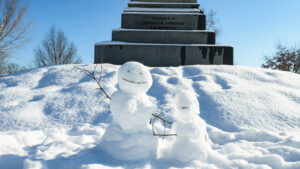
Trinity College in Photos: January 2026
January 2026 was marked by the start of a new semester and new calendar year, notably impacted by one of Connecticut's biggest snowstorms in years.
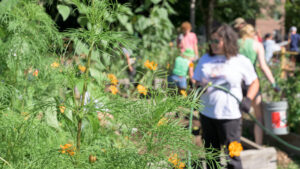
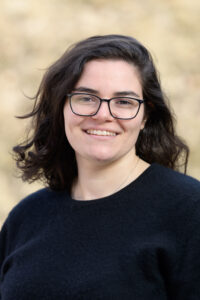
This Earth Month, Trinity celebrates the efforts of Trinity College’s sustainability coordinator, Hayley Berliner. Berliner, who has been at Trinity since 2022, has worked to move the College to a silver STARs rating by Association for the Advancement of Sustainability in Higher Education.
Berliner is leading Trinity’s Earth Month programming, which begins with a spring cleanup at Trinfo and Greenfest at The Mill on Saturday, April 5. See the calendar of Earth Month events for more information.
Here, Berliner addresses the five most common myths people at Trinity have about the College’s sustainability efforts.
Trinity recycles across campus using single-stream recycling. Custodians collect the recycling bags and bring them outside to waste areas or dumpsters for the Grounds team to pick up with the recycling truck. The Grounds crew inspects the clear bag to see if it contains contaminants. If the bag is uncontaminated, the Grounds crew throws the bag in the recycling truck and takes it to the recycling center off campus. If it is contaminated, that bag must go in the trash. This often leads to the misconception that we don’t recycle because some contaminated recycling bags end up in the trash. The most common items we see contaminating the recycling are:
In addition to the “traditional” recyclable items, Trinity also recycles mattresses, cooking oil, shredded paper, batteries, light bulbs, electronics, plastic bags and films, and more.
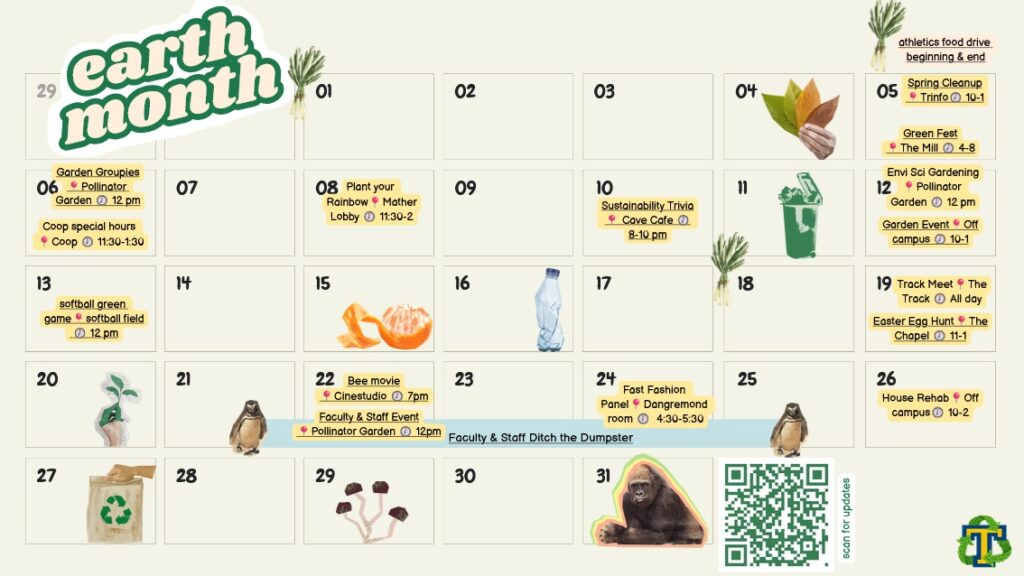
Tap water in Hartford is safe to drink. According to a 2023 Report on Water Quality from The Metropolitan District:
“The MDC has always filtered its water supplies. The slow sand filtration plant located just off Farmington Avenue in West Hartford contains 22 underground filter beds. In the filter beds, water trickles down through more than 3 feet of sand and stones, where within the first 2 to 3 inches of sand, solids and microscopic bacteria are trapped. Additional chemical treatment follows to eliminate any remaining bacteria. The Reservoir No. 6 plant in Bloomfield is a dual media filtration facility, also known as a complete conventional plant. The system combines chemical treatment prior to filtration at six filter beds. Because pre-treatment removes most impurities, the rapid sand filtration process can remove those remaining impurities quickly. While the filtration process is accomplished somewhat differently at each plant, there are five basic components in the treatment process that the plants have in common:
If you see a bottle filler with a red light indicating the filter needs to be changed, the water coming out is still safe to drink. (But send a note to [email protected] so they can change the filter.)
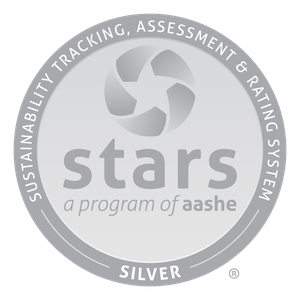 There are many myths about composting: that it’s complicated, that it requires a special recipe, that it needs a lot of space. In truth, it’s very easy to compost and requires next to nothing. According to vegogarden.com:
There are many myths about composting: that it’s complicated, that it requires a special recipe, that it needs a lot of space. In truth, it’s very easy to compost and requires next to nothing. According to vegogarden.com:
“Composting is a natural process that anyone can learn to do with a little bit of research and experimentation. While it helps to understand the basics of composting, such as the importance of green and brown materials and proper aeration, there’s no need for advanced scientific knowledge. With some trial and error, anyone can become a successful composter and reap the benefits of nutrient-rich soil for their gardens.”
Trinity makes composting incredibly easy. Simply scrape your left-over food into one of the compost bins in Mather and we do the rest. Alternately, if you have leftovers, you might elect to use one of Trinity’s new reusable takeout containers!
Plenty of students, faculty, staff, and Hartford residents take the bus. In fact, in the 2023-2024 academic year, Trinity students rode the bus more than 15,000 times.
Taking the bus is a very convenient way to get downtown, to Walmart, to Westfarms Mall, and more. Trinity community members can even get a free Bantam Bus Pass from the Office of Community Service and Civic Engagement for free rides on CT Transit buses.
Though in the past, Ditch the Dumpster has been a student-focused event, this year, faculty and staff will be invited to participate. April 21-25, faculty and staff are invited to take part in Ditch the Dumpster by cleaning out their offices and donating extra supplies, small furniture, lamps, fans, mini-fridges, and more. Donated items can be brought to the Community Service and Civic Engagement Office in the basement of Mather.